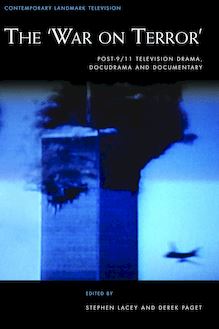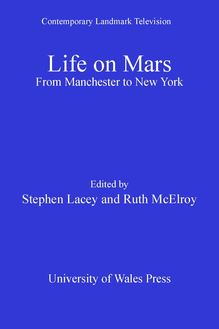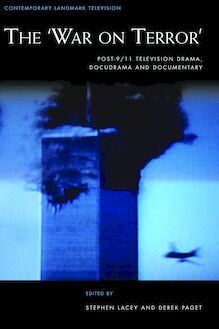-
 Univers
Univers
-
 Ebooks
Ebooks
-
 Livres audio
Livres audio
-
 Presse
Presse
-
 Podcasts
Podcasts
-
 BD
BD
-
 Documents
Documents
-
- Cours
- Révisions
- Ressources pédagogiques
- Sciences de l’éducation
- Manuels scolaires
- Langues
- Travaux de classe
- Annales de BEP
- Etudes supérieures
- Maternelle et primaire
- Fiches de lecture
- Orientation scolaire
- Méthodologie
- Corrigés de devoir
- Annales d’examens et concours
- Annales du bac
- Annales du brevet
- Rapports de stage
La lecture à portée de main
212 pages
English
Découvre YouScribe en t'inscrivant gratuitement
Je m'inscrisDécouvre YouScribe en t'inscrivant gratuitement
Je m'inscris
Obtenez un accès à la bibliothèque pour le consulter en ligne
En savoir plus
En savoir plus
212 pages
English
Obtenez un accès à la bibliothèque pour le consulter en ligne
En savoir plus
En savoir plus

Description
This book explores the ways in which television has engaged directly and indirectly with the new realities of the post-9/11 world. It offers detailed analysis of a number of key programmes and series that engage with, or are haunted by, the aftermath of the events of September 11 in the USA and what is unavoidably through problematically and contentiously referred to as the resulting ‘war on terror’.
The substantive part of the book is a series of independent chapters, each written on a different topic and considering different programmes. It includes series and single dramas representing the invasion of Iraq (The Mark of Cain, Occupation and Generation Kill), comedic representations (Gary, Tank Commander), documentary (the BBC Panorama’s coverage of 9/11), ‘what if’ docudramas (Dirty War), 9/11 in popular series (CSI:NY) and representations of Tony Blair in drama and docudrama. The book concludes with an extended reflection on contemporary docudrama and an interview with filmmaker and docudramatist Peter Kosminsky.
1. Introduction
Stephen Lacey and Derek Paget
2. Ways of Showing, Ways of Telling
Derek Paget
3. Embedded dramaturgy – representing the ‘war on terror’ from within: Ten Days to War, The Mark of Cain and Occupation
Stephen Lacey
4. Post 9/11 American Television Drama: 24 and Generation Kill as Melodrama
Steve Lipkin
5. The comedy of terror: Gary: Tank Commander and the TV sitcom’s ‘discourse of impropriety’.
Bruce Bennett
6. The Paranoid Style’s traumatic speculations of suffering
Hugh Ortega Breton
7. Mac and Monotheism: Remembering 9/11, Surviving Trauma and Mourning Work in CSI: NY
Janet McCabe
8. Britz, Contemporary British National Identity and the ‘War on Terror’
Steve Blandford
9. ‘It Won’t Be Iraq They’ll Remember Me For, Will It?’: Tony Blair and Dramatisations of The War On Terror
Stella Bruzzi
10. Panorama's coverage of 9/11 and the ‘War on Terror'
David McQueen
11. Interview with Peter Kosminsky
Peter Kosminsky and Derek Paget
12. Texts cited
13. Bibliography
The substantive part of the book is a series of independent chapters, each written on a different topic and considering different programmes. It includes series and single dramas representing the invasion of Iraq (The Mark of Cain, Occupation and Generation Kill), comedic representations (Gary, Tank Commander), documentary (the BBC Panorama’s coverage of 9/11), ‘what if’ docudramas (Dirty War), 9/11 in popular series (CSI:NY) and representations of Tony Blair in drama and docudrama. The book concludes with an extended reflection on contemporary docudrama and an interview with filmmaker and docudramatist Peter Kosminsky.
1. Introduction
Stephen Lacey and Derek Paget
2. Ways of Showing, Ways of Telling
Derek Paget
3. Embedded dramaturgy – representing the ‘war on terror’ from within: Ten Days to War, The Mark of Cain and Occupation
Stephen Lacey
4. Post 9/11 American Television Drama: 24 and Generation Kill as Melodrama
Steve Lipkin
5. The comedy of terror: Gary: Tank Commander and the TV sitcom’s ‘discourse of impropriety’.
Bruce Bennett
6. The Paranoid Style’s traumatic speculations of suffering
Hugh Ortega Breton
7. Mac and Monotheism: Remembering 9/11, Surviving Trauma and Mourning Work in CSI: NY
Janet McCabe
8. Britz, Contemporary British National Identity and the ‘War on Terror’
Steve Blandford
9. ‘It Won’t Be Iraq They’ll Remember Me For, Will It?’: Tony Blair and Dramatisations of The War On Terror
Stella Bruzzi
10. Panorama's coverage of 9/11 and the ‘War on Terror'
David McQueen
11. Interview with Peter Kosminsky
Peter Kosminsky and Derek Paget
12. Texts cited
13. Bibliography
Sujets
Informations
| Publié par | University of Wales Press |
| Date de parution | 22 mai 2015 |
| Nombre de lectures | 0 |
| EAN13 | 9781783162468 |
| Langue | English |
| Poids de l'ouvrage | 2 Mo |
Informations légales : prix de location à la page 0,1900€. Cette information est donnée uniquement à titre indicatif conformément à la législation en vigueur.
Extrait
CONTEMPORARY LANDMARK TELEVISION THE ‘WAR ON TERROR’
Series editors Professor Steve Blandford (University of South Wales) Professor Stephen Lacey (University of South Wales) Dr Ruth McElroy (University of South Wales)
CONTEMPORARY LANDMARK TELEVISION
THE ‘WAR ON TERROR’ POST-9/11 TELEVISION DRAMA, DOCUDRAMA AND DOCUMENTARY
Edited by Stephen Lacey and Derek Paget
U N I V E R S I T Y O F W A L E S P R E S S 2 0 1 5
© The Contributors, 2015
All rights reserved. No part of this book may be reproduced in any material form (including photocopying or storing it in any medium by electronic means and whether or not transiently or incidentally to some other use of this publication) without the written permission of the copyright owner except in accordance with the provisions of the Copyright, Designs and Patents Act 1988. Applications for the copyright owner’s written permission to reproduce any part of this publica tion should be addressed to The University of Wales Press, 10 Columbus Walk, Brigantine Place, Cardiff CF10 4UP.
www.uwp.co.uk
British Library CataloguinginPublication Data A catalogue record for this book is available from the British Library.
ISBNeISBN
9781783162451 9781783162468
The right of the Contributors to be identified as authors of this work has been asserted in accordance with sections 77, 78 and 79 of the Copyright, Designs and Patents Act 1988.
Designed and typeset by Chris Bell, cbdesign Printed by CPI Antony Rowe, Chippenham, Wiltshire
CONTENTS
Series Editors’ Preface
Notes on Contributors
Introduction Stephen Lacey and Derek Paget
1Ways of Showing, Ways of TellingTelevision and 9/11 Derek Paget
2 Embedded Dramaturgy Representing the ‘War on Terror’ from Within: Ten Days to War,The Mark of CainandOccupation Stephen Lacey
3American Television Drama Post9/11 24andGeneration Killas Melodrama Stephen N. Lipkin
4The Comedy of Terror Gary: Tank Commanderand the TV Sitcom’s ‘Discourse of Impropriety’ Bruce Bennett
5The Paranoid Style’s Traumatic Speculations of Suffering Hugh Ortega Breton
6 Mac and Monotheism Remembering 9/11, Surviving Trauma and Mourning Work inCSI: NY Janet McCabe
7Britz, Contemporary British National Identity and the ‘War on Terror’ Steve Blandford
vii
ix
1
11
33
49
65
81
95
109
8‘It Won’t Be Iraq They’ll Remember Me For, Will It?’ Tony Blair and Dramatisations of the ‘War On Terror’ Stella Bruzzi
9Panorama’s Coverage of 9/11 and the ‘War on Terror’ David McQueen
10Interview with Peter Kosminsky Derek Paget
Texts Cited
Bibliography
Index
125
143
161
175
179
191
SERIES EDITORS’ PREFACE
HERE IS NO DOUBTthat the landscape of broadcasting has been trans riseTthe Internet), the internationalisation of television formats and pro of formed in recent years, and the speed of change shows no sign of slowing. Technological change (satellite and digital television, the grammes, the availability of DVD boxsets, new technologies for recording and timeshifting viewing, the proliferation of TV channels and the segmenta tion of the TV audience – these have all ensured that television, once dubbed ‘ephemeral’, is now a major cultural commodity in a global marketplace. The discipline of television studies, although a relative newcomer to the field of cultural and media studies, has grown confident in its ability to confront and debate the challenges that the new ecology of broadcasting poses. Contemporary Landmark Television focuses on one corner of the wider picture, British programmes, in recognition of their continuing significance for both home and overseas audiences. The series offers scholars and lectur ers timely investigations of current UK broadcasting, through a focus upon television’s prime output: programmes. By being responsive to the contem porary television landscape, the series recognises that television scholarship benefits from engaging with the current viewing experience of scholars and students. For us, one of the enduring values of television as a mass medium lies in its contemporaneity with its audience; television exists in the moment – even when that ‘moment’ is lengthened by new technologies of recording and distribution – and in so doing, enjoys a privileged position as a creative source of artistic and social intervention in the world of its viewers. The choice to engage with programmes themselves is recognition of the turn towards television aesthetics in recent scholarship, and of the now contentious nature of some of the accepted categories. Terms such as ‘land mark’, and its synonyms such as ‘classic’ or ‘quality’, cannot be assumed but must be debated, and a reflection on key terms is an important aspect of the series’ approach. Also, broadcasters such as the BBC and Channel 4 have sought to meet the challenge of digitalisation by exploiting online programme
SERIES EDITORS’ PREFACE
assemblages (the chat room, forum, and programme games and quizzes), and these have become staples of British television drama, in the process significantly extending our understanding of what constitutes a television programme. Therefore, an important emphasis of the series is the treatment of individual programmes or series ‘in the round’ – in their production and reception contexts, and where relevant in their different iterations. It also draws on, where possible, the perspectives of practitioners and television pro fessionals themselves. Programmes – even longrunning series – exist in a wider context of other programmes, and the series will occasionally consider clusters of programmes linked by a common theme. Although aimed primarily at students and scholars of television, Con temporary Landmark Television intends to be accessible to the general reader with an interest in how television programmes have been commissioned, pro duced, debated and enjoyed, as well as to professional broadcasters. Whoever the reader, we hope that he or she will be both stimulated and challenged by the experience.
viii
NOTES ON CONTRIBUTORS
Dr Bruce Bennettis Director of Film Studies in the Lancaster Institute for the Contemporary Arts at Lancaster University. Publications include articles on celebrity culture, James Cameron and blockbuster cinema, the aesthetics of digital 3D cinema, border cinema and the figure of the immigrant, and the ‘war on terror’ in film, television and photojournalism. He is author of the monographThe Cinema of Michael Winterbottom: Borders, Intimacy, Terror (Columbia University Press, 2014) and coeditor of the collectionCinema and Technology: Theories, Cultures, Practices(Palgrave Macmillan, 2008).
Steve Blandfordis Emeritus Professor of the University of South Wales. Until 2013, he was Director of the Centre for the Study of Media and Culture of Small Nations, and was coresearcher on ‘Screening the Nation: Landmark Television in Wales’ for the BBC Trust and Audience Council Wales (2009–10). He has published widely on British television and theatre, includingFilm, Drama and The BreakUp of Britain(Intellect, 2007),Theatre and Perfor mance in Small Nations(Intellect, 2012) andJimmy McGovern(MUP, 2013). He is a member of the Board of the National Theatre of Wales.
Stella BruzziProfessor of Film and Television Studies at the University is of Warwick and a Fellow of the British Academy. Her publications include the monographsUndressing Cinema: Clothing and Identity in the Movies (Routledge, 1997),New Documentary (Routledge, 2000 and 2006),Bring ing Up Daddy: Fatherhood and Masculinity in Postwar Hollywood (BFI, 2005),Seven Up(2006) andMen’s Cinema: Masculinity and MiseenScene in Hollywood(EUP, 2013). With Pamela Church Gibson she coeditedFashion Cultures: Theories, Exploration and Analysis(Routledge, 2000) andFashion Cultures Revisited(Routledge, 2013).
Peter Kosminskyan internationally known writer and filmmaker, is whose career has included documentaries, feature films and, significantly,
-
 Univers
Univers
-
 Ebooks
Ebooks
-
 Livres audio
Livres audio
-
 Presse
Presse
-
 Podcasts
Podcasts
-
 BD
BD
-
 Documents
Documents
-
Jeunesse
-
Littérature
-
Ressources professionnelles
-
Santé et bien-être
-
Savoirs
-
Education
-
Loisirs et hobbies
-
Art, musique et cinéma
-
Actualité et débat de société
-
Jeunesse
-
Littérature
-
Ressources professionnelles
-
Santé et bien-être
-
Savoirs
-
Education
-
Loisirs et hobbies
-
Art, musique et cinéma
-
Actualité et débat de société
-
Actualités
-
Lifestyle
-
Presse jeunesse
-
Presse professionnelle
-
Pratique
-
Presse sportive
-
Presse internationale
-
Culture & Médias
-
Action et Aventures
-
Science-fiction et Fantasy
-
Société
-
Jeunesse
-
Littérature
-
Ressources professionnelles
-
Santé et bien-être
-
Savoirs
-
Education
-
Loisirs et hobbies
-
Art, musique et cinéma
-
Actualité et débat de société
- Cours
- Révisions
- Ressources pédagogiques
- Sciences de l’éducation
- Manuels scolaires
- Langues
- Travaux de classe
- Annales de BEP
- Etudes supérieures
- Maternelle et primaire
- Fiches de lecture
- Orientation scolaire
- Méthodologie
- Corrigés de devoir
- Annales d’examens et concours
- Annales du bac
- Annales du brevet
- Rapports de stage
Signaler un problème
YouScribe
Le catalogue
Le service
© 2010-2024 YouScribe








